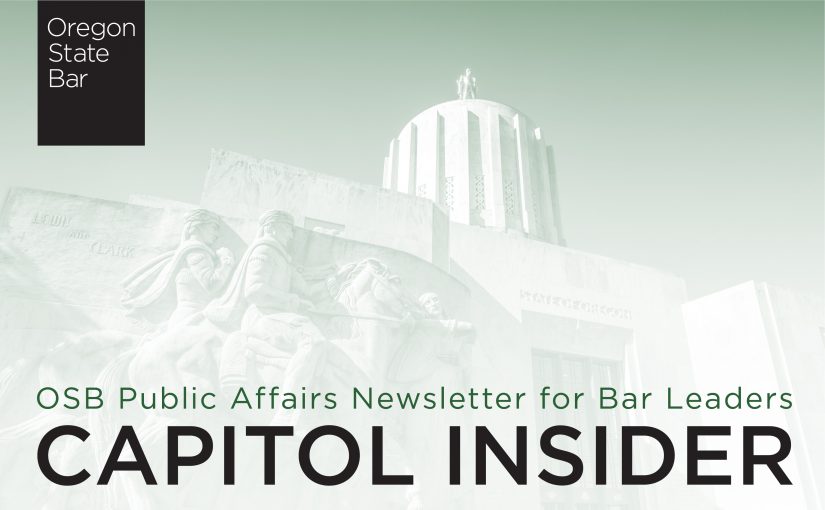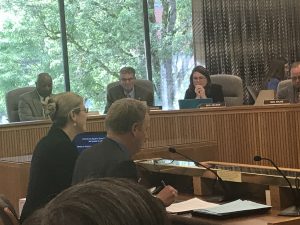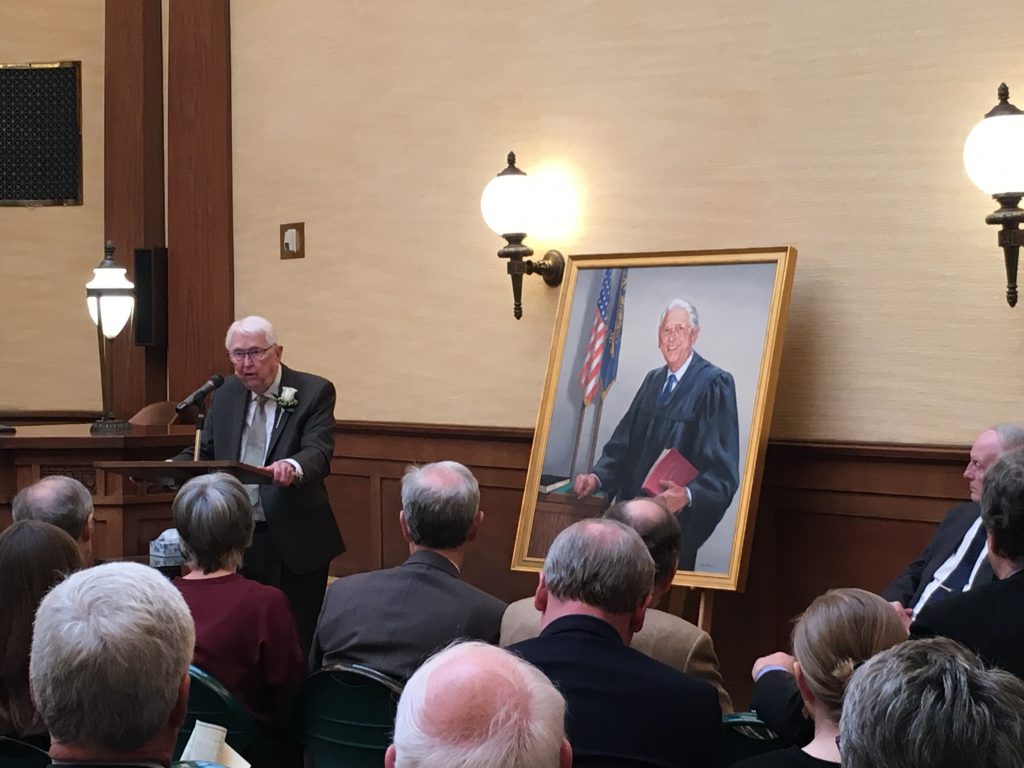Table of Contents
- Oregon eCourt Survey for Practitioners
- Gearing up for the 2019 OSB Law Improvement Program
- Senate and House Interim Judiciary Committees Meet Jointly during Legislative Days
- Senate Interim Judiciary Committee and Oregon State Bar Host CLE at the Oregon State Capitol on Procedural Justice
- What’s Next?
Oregon eCourt Survey for Practitioners
The joint Oregon Judicial Department/Oregon State Bar Task Force on Oregon eCourt Implementation is looking for feedback. Last spring the task force solicited feedback on Oregon eCourt as a part of the Judicial Department’s quality assurance process. Now that eCourt has been implemented in every district and efiling is mandatory throughout the state, the task force is looking for your thoughts, feedback, suggestions, and concerns regarding electronic filing and document access. The survey can be found here. The survey will close on December 22, 2017.
Gearing up for the 2019 OSB Law Improvement Program
Is your section or committee interested in the legislative process? Is there a statutory fix that needs to be made? It may feel like the 2017 legislative session just ended, but it’s time to start planning for the 2019 legislative session. The Oregon State Bar Law Improvement Program is an avenue for Bar sections and committees to participate in the legislative process. Law improvement legislation includes proposals to clarify statutory ambiguities, to modify unforeseen “glitches” in major legislation passed in previous sessions, and to codify case law as necessary. In 2017, Bar members advocated for changes to the Uniform Trust Code, an incorporation of electronic technology into the corporate and LLC statutes, and spousal support modifications.
The Public Affairs Committee (PAC) of the Board of Governors oversees the Bar’s legislative activities and establishes priorities on public policy issues important to the legal profession. The PAC, chaired by Kathleen Rastetter, is made up of eight members of the Board of Governors. If your Bar group intends to propose legislation for the 2019 legislative session, proposals should be submitted to the board’s Public Affairs Committee through the Public Affairs Department by April 2, 2018, for approval and presession drafting and filing. Bar legislative activities involve the regulation of the legal profession or the improvement of the quality of legal services available to the people of Oregon.
Over the next few months, members of the Public Affairs Department will be visiting sections and committees to provide additional information, answer questions, and explain more about the process. If you have questions, please contact Public Affairs staff at [email protected] or (503) 431-6376.
Senate and House Interim Judiciary Committees Meet Jointly during Legislative Days
During the most recent Legislative Days, the Senate and House Interim Judiciary Committees met to discuss a number of issues, including 2018 legislative committee proposals, non-unanimous juries, preliminary hearings, distracted driving, medical marijuana regulations, and failure to perform duties of a driver. The hearing is available online at http://oregon.granicus.com/MediaPlayer.php?clip_id=24294.
For the 2018 session, the Senate and House Judiciary Committees are each proposing three bill concepts for drafting. The House Judiciary Committee is considering an omnibus bill, a consumer protection bill, and a bill dealing with amateur athletes. The Senate Judiciary Committee is considering a bill dealing with data breach and identity theft, an omnibus bill, and a third bill that has not been finalized.
Two of the larger issues addressed during the hearing were an overview of non-unanimous juries in Oregon and an overview of preliminary hearings and the implementation of grand jury recording in Multnomah County.
Non-Unanimous Jury Verdicts – Oregon and Louisiana are the only states in the country that allow for non-unanimous jury verdicts in criminal cases. Professor Aliza Kaplan from Lewis & Clark Law School shared research and historical perspective on the use of a non-unanimous jury with the committee. Tim Colahan, Executive Director of the Oregon District Attorneys Association, discussed how the non-unanimous jury process works in Oregon and the distinctions between Oregon and Louisiana.
Preliminary Hearings – Senate Bill 505, which created a grand jury recording pilot program in Multnomah, Jackson, and Deschutes counties, was passed during the 2017 legislative session. Representatives from the Oregon Judicial Department, the Multnomah County Circuit Court, the Multnomah County District Attorney’s office, and the two public defender groups in Multnomah County testified about the preliminary hearing process as well as the preparations for the implementation of grand jury recording. In response to the passage of the bill, two of the three pilot circuit courts are planning to use preliminary hearings rather than the grand jury process. 85% of criminal cases in Multnomah County are expected to go through a preliminary hearing rather than before a grand jury, while 25% of the criminal cases in Jackson County will be moving to preliminary hearings. Deschutes County, however, is expected to continue with the grand jury process. Once the grand jury recording requirements expand into additional counties in 2019, the Oregon Judicial Department is expecting an additional 20,000 hearings.
Senate Interim Judiciary Committee and Oregon State Bar Host CLE at the Oregon State Capitol on Procedural Justice
On November 14, Judge Nan Waller, Multnomah County Presiding Judge, and Judge Maureen McKnight, Multnomah County Chief Family Court Judge, presented a lunchtime access-to-justice CLE on procedural justice. The CLE focused on the concepts and theories behind procedural justice and the changes the Multnomah County courts have implemented to better meet the needs of Oregonians using the courthouse and services. Discussion focused on the use of interactive forms, courthouse listening sessions, training and peer review, and structural changes such as the new Multnomah County courthouse and the creation of a Legal Resource Center within the courthouse.
Thank you to Judge Waller and Judge McKnight for participating!
What’s Next?
January Organizational Days: January 10-12, 2018
Deadline for bill submission: January 16, 2018
Beginning of the 2018 Legislative Session: February 5, 2018
OSB President’s Reception: February 22, 2018
Constitutional Sine die (end of session) for 2018 Legislative Session: March 9, 2018
Archives
Thank you for reading the Oregon State Bar’s CAPITOL INSIDER.
The archives are available here.
2017 Public Affairs Committee Members
Kathleen Rastetter, Chair
John Mansfield, Vice Chair
Guy Greco
John Bachofner
Chris Costantino
Rob Gratchner
Eric Foster
Liani Reeves
Public Affairs Department
Susan Grabe, Public Affairs Director
Amy Zubko, Public Affairs Legislative Attorney
Matt Shields, Public Affairs Staff Attorney
Kellie Baumann, Public Affairs Assistant


